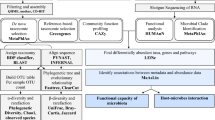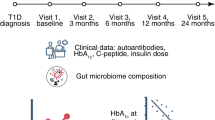Abstract
Purpose
To explore associations between the gut microbiome and overactive bladder (OAB) with daily urinary urgency among individuals reporting this diagnosis within a single community.
Methods
This cross-sectional study surveyed 1113 individuals who participated in the Iwaki Health Promotion Project in Japan. OAB was defined as urinary urgency at least once per week and an Overactive Bladder Symptom Score (OABSS) of ≥ 3. OAB with urinary urgency at least once a day was defined as daily urgency. The gut microbiomes were assessed by next-generation sequencing of 16S rRNA genes extracted from fecal samples. The participants were divided into two groups: OAB-daily urgency and non-OAB. Cases were selected for inclusion on the basis of 1:1 propensity score matching; we assigned 58 individuals to each group (23 men and 35 women) for our analysis.
Results
Individuals reporting OAB with daily urinary urgency demonstrated a lower bacterial diversity between individuals (Bray–Curtis distance 0.48 vs. 0.53, P < 0.001); the results cluster differently in the non-OAB groups. The relative abundance of genus Bifidobacterium was significantly lower among those reporting daily urgency (2.41% vs. 4.23%, P = 0.014). By contrast, the relative abundance of genus Faecalibacterium (9.25% vs. 6.26%, P = 0.006) was significantly higher in this group.
Conclusion
We observed significant differences in gut microbial contents and specific bacterial genera in association with OAB with daily urgency. Further study will be necessary to assess causal relationships between the gut microbiome and OAB.

Similar content being viewed by others
References
Matsumoto S, Hashizume K, Wada N, Hori J, Tamaki G, Kita M et al (2013) Relationship between overactive bladder and irritable bowel syndrome: a large-scale internet survey in Japan using the overactive bladder symptom score and Rome III criteria. BJU Int 111:647–652
Leron E, Weintraub AY, Mastrolia SA, Schwarzman P (2018) Overactive bladder syndrome: evaluation and management. Curr Urol 11:117–125
OToole PW, Jeffery IB (2015) Gut microbiota and aging. Science 350:1214–1215
Barlow GM, Yu A, Mathur R (2015) Role of the gut microbiome in obesity and diabetes mellitus. Nutr Clin Pract 30:787–797
Yin J, Liao S-X, He Y, Wang S, Xia G-H, Liu F-T et al (2015) Dysbiosis of gut microbiota with reduced trimethylamine-N-oxide level in patients with large-artery atherosclerotic stroke or transient ischemic attack. J Am Heart Assoc 4(11):e002699
Li J, Zhao F, Wang Y, Chen J, Tao J, Tian G et al (2017) Gut microbiota dysbiosis contributes to the development of hypertension. Microbiome 5:14
Antunes-Lopes T, Vale L, Coelho AM, Silva C, Rieken M, Geavlete B et al (2018) The role of urinary microbiota in lower urinary tract dysfunction: a systematic review. Eur Urol Focus 6(2):361–369
Matsumoto T, Hatakeyama S, Imai A, Tanaka T, Hagiwara K, Konishi S et al (2019) Relationship between oxidative stress and lower urinary tract symptoms: results from a community health survey in Japan. BJU Int 123:877–884
Kanbay M, Onal EM, Afsar B, Dagel T, Yerlikaya A, Covic A et al (2018) The crosstalk of gut microbiota and chronic kidney disease: role of inflammation, proteinuria, hypertension, and diabetes mellitus. Int Urol Nephrol 50:1453–1466
Chung M-S, Chuang Y-C, Lee J-J, Lee W-C, Chancellor MB, Liu R-T (2014) Prevalence and associated risk factors of nocturia and subsequent mortality in 1,301 patients with type 2 diabetes. Int Urol Nephrol 46:1269–1275
Pittayanon R, Lau JT, Yuan Y, Leontiadis GI, Tse F, Surette M et al (2019) Gut microbiota in patients with irritable bowel syndrome-a systematic review. Gastroenterology 157:97–108
Christianson JA, Liang R, Ustinova EE, Davis BM, Fraser MO, Pezzone MA (2007) Convergence of bladder and colon sensory innervation occurs at the primary afferent level. Pain 128:235–243
Okamoto T, Hatakeyama S, Imai A, Konishi S, Okita K, Yamamoto H et al (2019) The relationship between gait function and erectile dysfunction: results from a community-based cross-sectional study in Japan. J Sex Med 16:1922–1929
Soma O, Hatakeyama S, Imai A, Matsumoto T, Hamano I, Fujita N et al (2019) Relationship between frailty and lower urinary tract symptoms among community‐dwelling adults. LUTS Low Urin Tract Symptoms luts.12292
Jenkinson C, Coulter A, Wright L (1993) Short form 36 (SF36) health survey questionnaire: normative data for adults of working age. BMJ 306:1437–1440
Silveira E, Taft C, Sundh V, Waern M, Palsson S, Steen B (2005) Performance of the SF-36 Health Survey in screening for depressive and anxiety disorders in an elderly female Swedish population. Qual Life Res 14:1263–1274
Matsuo S, Imai E, Horio M, Yasuda Y, Tomita K, Nitta K et al (2009) Revised equations for estimated GFR from serum creatinine in Japan. Am J Kidney Dis 53:982–992
Kanazawa M, Palsson OS, Thiwan SIM, Turner MJ, van Tilburg MAL, Gangarosa LM et al (2008) Contributions of pain sensitivity and colonic motility to IBS symptom severity and predominant bowel habits. Am J Gastroenterol 103:2550–2561
Homma Y, Yoshida M, Seki N, Yokoyama O, Kakizaki H, Gotoh M et al (2006) Symptom assessment tool for overactive bladder syndrome—overactive bladder symptom score. Urology 68:318–323
Shoskes DA, Wang H, Polackwich AS, Tucky B, Altemus J, Eng C (2016) Analysis of gut microbiome reveals significant differences between men with chronic prostatitis/chronic pelvic pain syndrome and controls. J Urol 196:435–441
Holland B, Karr M, Delfino K, Dynda D, El-Zawahry A, Braundmeier-Fleming A et al (2019) The effect of the urinary and fecal microbiota on lower urinary tract symptoms measured by the international prostate symptom score: analysis utilizing next-generation sequencing. BJU Int. https://doi.org/10.1111/bju.14972
Duan R, Zhu S, Wang B, Duan L (2019) Alterations of gut microbiota in patients with irritable bowel syndrome based on 16S rRNA-targeted sequencing: a systematic review. Clin Transl Gastroenterol 10:e00012
Tap J, Derrien M, Törnblom H, Brazeilles R, Cools-Portier S, Doré J et al (2017) Identification of an intestinal microbiota signature associated with severity of irritable bowel syndrome. Gastroenterology 152:111–123.e8
Leue C, Kruimel J, Vrijens D, Masclee A, van Os J, van Koeveringe G (2017) Functional urological disorders: a sensitized defence response in the bladder-gut-brain axis. Nat Rev Urol 14:153–163
Carabotti M, Scirocco A, Maselli MA, Severi C (2015) The gut-brain axis: interactions between enteric microbiota, central and enteric nervous systems. Ann Gastroenterol 28:203–209
Cheung SG, Goldenthal AR, Uhlemann A-C, Mann JJ, Miller JM, Sublette ME (2019) Systematic review of gut microbiota and major depression. Front Psychiatry 10:34
Lo Presti A, Zorzi F, Del Chierico F, Altomare A, Cocca S, Avola A et al (2019) Fecal and mucosal microbiota profiling in irritable bowel syndrome and inflammatory bowel disease. Front Microbiol 10:1655
Rivière A, Selak M, Lantin D, Leroy F, De Vuyst L (2016) Bifidobacteria and butyrate-producing colon bacteria: importance and strategies for their stimulation in the human gut. Front Microbiol 7:979
Didari T, Solki S, Mozaffari S, Nikfar S, Abdollahi M (2014) A systematic review of the safety of probiotics. Expert Opin Drug Saf 13:227–239
Pinto-Sanchez MI, Hall GB, Ghajar K, Nardelli A, Bolino C, Lau JT et al (2017) Probiotic Bifidobacteriumlongum NCC3001 reduces depression scores and alters brain activity: a pilot study in patients with irritable bowel syndrome. Gastroenterology 153:448–459.e8
Ee C, Jw J, Ee B (2015) Short-chain fatty acids in control of body weight and insulin sensitivity. Nat Rev Endocrinol 11:577
Jiang H, Ling Z, Zhang Y, Mao H, Ma Z, Yin Y et al (2015) Altered fecal microbiota composition in patients with major depressive disorder. Brain Behav Immun 48:186–194
Tana C, Umesaki Y, Imaoka A, Handa T, Kanazawa M, Fukudo S (2009) Altered profiles of intestinal microbiota and organic acids may be the origin of symptoms in irritable bowel syndrome. Neurogastroenterol Motil 22(512–9):e114–e115
Kashyap MP, Pore SK, de Groat WC, Chermansky CJ, Yoshimura N, Tyagi P (2018) BDNF overexpression in the bladder induces neuronal changes to mediate bladder overactivity. Am J Physiol Physiol 315:F45–56
Acknowledgements
We would like to thank Ippei Takahashi, Shizuka Kurauchi, Yuki Fujita, Yukie Nishizawa, Satomi Sakamoto, and the entire staff of the Department of Social Medicine in Hirosaki University for their invaluable help with the collection of data. This work was supported by JST COI Grant Number JPMJCE1302. The authors would also like to thank Enago (https://www.enago.jp) for the English language review.
Funding
This work was supported by a Grant-in-Aid for Scientific Research (Grant Nos. 18K16682 and 18K16717) from the Japan Society for the Promotion of Science.
Author information
Authors and Affiliations
Contributions
TO: data analysis, manuscript writing. SH: data analysis, manuscript editing. AI, HY, TY, KM, TY, and YH: data collection. SN and CO: project development.
Corresponding author
Ethics declarations
Conflict of interest
All authors declare that they have no conflicts of interest.
Research involving human participants and/or animals
The study was conducted following the ethical guidelines of the Declaration of Helsinki, and the use of data from the Iwaki Health Promotion Project was approved by the Ethics Committee of Hirosaki University School of Medicine (authorization number 2018-062).
Informed consent
All participants voluntarily provided written informed consent.
Additional information
Publisher's Note
Springer Nature remains neutral with regard to jurisdictional claims in published maps and institutional affiliations.
Electronic supplementary material
Below is the link to the electronic supplementary material.
345_2020_3243_MOESM1_ESM.pptx
Supplementary file1. Figure S1. LEfSe analysis between the participants with depressive status (SF-36 MH < 52.0) and those without. The genera of Parabacteroides and Oscillibacter were overrepresented in the participants with depressive status. (PPTX 62 kb)
Rights and permissions
About this article
Cite this article
Okamoto, T., Hatakeyama, S., Imai, A. et al. Altered gut microbiome associated with overactive bladder and daily urinary urgency. World J Urol 39, 847–853 (2021). https://doi.org/10.1007/s00345-020-03243-7
Received:
Accepted:
Published:
Issue Date:
DOI: https://doi.org/10.1007/s00345-020-03243-7




